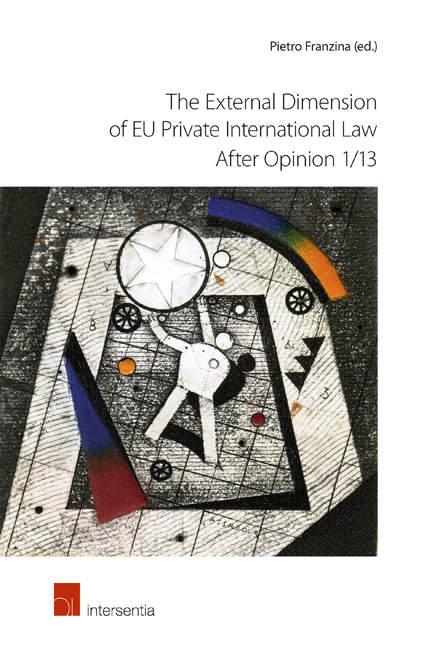Book contents
- Frontmatter
- Preface
- Contents
- PART I THE INTERNATIONAL PROJECTION OF EU PRIVATE INTERNATIONAL LAW - SOME BASIC ISSUES
- PART II OPINION 1/13 AND ITS IMPLICATIONS
- PART III THE CHANGING FEATURES OF EU EXTERNAL RELATIONS IN THE AREA OF PRIVATE INTERNATIONAL LAW
- PART IV EU LEGISLATION ON PRIVATE INTERNATIONAL LAW AND EXTRA-EUROPEAN SITUATIONS
- The Interplay of EU Legislation and International Developments in Private International Law
Jurisdiction Under the EU Succession Regulation and Relationships with Third Countries
from PART IV - EU LEGISLATION ON PRIVATE INTERNATIONAL LAW AND EXTRA-EUROPEAN SITUATIONS
Published online by Cambridge University Press: 15 December 2017
- Frontmatter
- Preface
- Contents
- PART I THE INTERNATIONAL PROJECTION OF EU PRIVATE INTERNATIONAL LAW - SOME BASIC ISSUES
- PART II OPINION 1/13 AND ITS IMPLICATIONS
- PART III THE CHANGING FEATURES OF EU EXTERNAL RELATIONS IN THE AREA OF PRIVATE INTERNATIONAL LAW
- PART IV EU LEGISLATION ON PRIVATE INTERNATIONAL LAW AND EXTRA-EUROPEAN SITUATIONS
- The Interplay of EU Legislation and International Developments in Private International Law
Summary
THE LIMITED ERGA OMNES APPROACH UNDERLYING THE SUCCESSION REGULATION's RULES ON JURISDICTION
THE INTER PARTES AND ERGA OMNES APPROACHES IN EU PRIVATE INTERNATIONAL LAW
A connection exists between the spatial scope of application of EU legislative measures relating to judicial cooperation in civil matters and the development of the external relations of the EU in the same field. EU measures apply, in principle, whenever an issue within their material scope of application is to be decided by a court, or other authority, of a Member State for which the relevant measure is in force. Two different scenarios, however, need to be considered in this respect, depending on whether the provision concerned is intended to apply erga omnes rather than inter partes. A provision is applicable erga omnes, or universally, if it is meant to cover all cases falling within its material scope of application. By contrast, a provision merely applies inter partes if additional requirements are set out to govern its applicability ratione loci or ratione personarum. These additional requirements have the effect of limiting the applicability of the provision in question to such situations as feature a particular connection with one or more Member States.
When EU private international law was still in its early stage of development, and EU legislative measures used to address separately either the issue of jurisdiction and the recognition and enforcement of judgments or the issue of applicable law, the coexistence of the two approaches did not give rise to particular problems. On the one side, the measures addressing solely choice-of-law issues, namely the Rome I Regulation on contractual obligations, the Rome II Regulation on non-contractual obligations and the Rome III Regulation on divorce and legal separation, all laid down rules of universal application. In this respect, they followed the example of the Rome Convention of 19 June 1980 on the law applicable to contractual obligations, which was in fact replaced by the first of the Regulations referred to above. The three Regulations are applicable universally in the sense that they also apply to those cases in which the relevant connecting factor, as set out in the Regulations themselves, would designate the law of a third country.
- Type
- Chapter
- Information
- Publisher: IntersentiaPrint publication year: 2016



